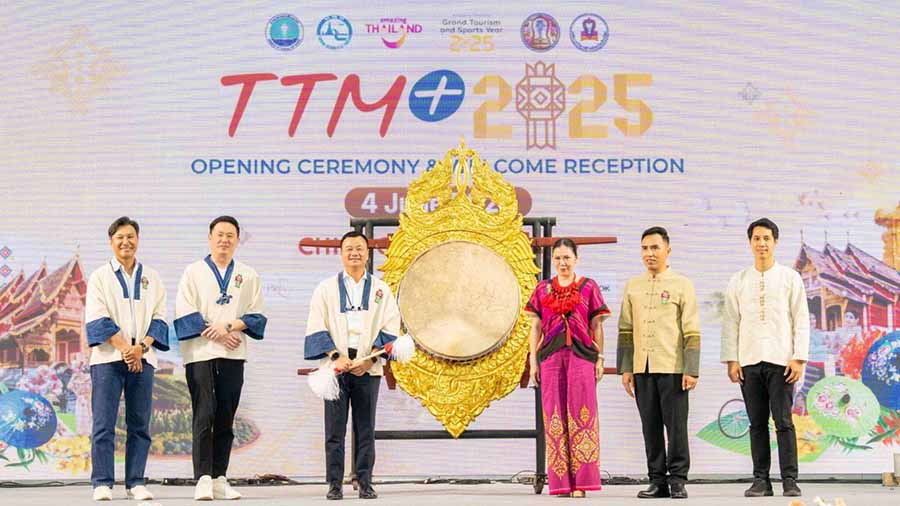
A new luxury train journey and enhanced high end wellness product were among the revelations at Thaialands annual B2B travel event in Chiang Mai. The 22nd Thailand Travel Mart Plus (TTM+) 2025 took place from June 4 to 6, 2025, at the Royal Park Rajapruek, under the theme “Amazing Thailand: Your Stories Never End.”
TTM+ 2025 brought together 406 international buyers from 50 countries, 450 Thai sellers (including 50 Thailand Tourism Awards winners and 30 from hidden-gem cities), and 111-117 international media representatives.
The event facilitated 13,000 business appointments, generating an estimated 4.2-4.29bn baht (approximately $116-$119m) in tourism revenue. Presentations highlighting “Five Must-Do” experiences (cultural immersion, wellness, and adventure), and emhasising high-value, eco-conscious tourism through initiatives like the Carbon Footprint Hotels (CF-Hotels) platform and the “Soul of Thailand: 3F Essentials” (Flavours, Fulfilment, Fabrics)
The event also showcased Chiang Mai’s Lanna heritage, with cultural experiences like the “Chiang Mai Night” and sustainable practices, including carbon offsetting and waste recycling, positioning Thailand as a global leader in responsible tourism.
In 2024, just over 70,000 Irish tourists visited Thailand and Bangkok has been declared as a priority for a direct service from Dublin airport, possibly as a winter seasonal service although at 9,860km it is just beyond the range of the new Aer Lingus A321XLR.
- The Thailand Product Update introduced initiatives like the Blue Jasmine Rail Journey (a nine-day luxury train from Bangkok to Chiang Mai, launching November 2025) and Lannatique by AWC, blending art, culture, and eco-conscious design.
- The event promoted lesser-known destinations like Nan Old Town (Asia’s only Green Destinations Gold Award winner) and Krabi’s low-carbon tourism model, encouraging sustainable travel beyond traditional hotspots.
- TTM+ 2025 was a certified Carbon Neutral Event, with emissions tracked and offset in partnership with the Provincial Electricity Authority (PEA). Waste was sorted, recycled, or donated, with surplus food and bamboo installations repurposed for local communities and schools, reinforcing Thailand’s green tourism leadership.
- The “Soul of Thailand: 3F Essentials” TTM Talk highlighted Thai soft power through Flavours (culinary tourism, e.g., Michelin-starred Sorn and Blackitch in Chiang Mai), Fulfilment (wellness via Lanna spa therapies), and Fabrics (Thai textiles), showcasing cultural heritage to enrich visitor experiences.
- The Travel Tech Zone featured AI-powered platforms like Smart Business AI, TATAI tourism data system, and TAGTHAi travel app, alongside AR maps, equipping operators for the digital economy and enhancing traveler experiences.
- The event generated over 13,000 business appointments and 4.2-4.29bn baht in revenue, connecting 406 international buyers (35.27pc first-time participants) from key markets (Europe, China, India, Malaysia, South Korea) with 450 Thai sellers, boosting Thailand’s tourism economy.
- TAT invited National Tourist Organisations from the Greater Mekong Subregion, Southeast Asia, and Chinese provinces, fostering regional cooperation. The presence of 111-117 media representatives amplified Chiang Mai’s role as a global tourism hub.
- The “Wisdom and Wellness Experience” showcased Lanna-inspired spa treatments, yoga, and wellness cuisine, while the Michelin Guide Thailand 2025 highlighted over 400 listings, including 50 in Chiang Mai, promoting culinary tourism.
- TTM+ 2025 highlighted events like the ONE Championship Muay Thai series, FIVB Women’s Volleyball World Championship, and Amazing Thailand Marathon, aligning with the Grand Tourism and Sports Year 2025.
- Immersive activities like Thai scent-making, mindful crafts, and the “Chiang Mai Night” cultural showcase connected attendees with Lanna heritage, fostering meaningful travel experiences that benefit local communities.
Thailand’s tourism industry remains a cornerstone of its economy, contributing significantly to GDP and employment. In 2025, the sector continues its robust recovery from the COVID-19 pandemic, nearing pre-pandemic levels with an estimated 36-39m international visitors and over 205m domestic trips, generating approximately 3.4 trillion baht (about $94.16bn) in revenue.
The Tourism Authority of Thailand (TAT) has declared 2025 the “Amazing Thailand Grand Tourism and Sports Year,” emphasizing sustainable, high-value, and culturally immersive experiences to drive economic growth.
Strategic initiatives like visa exemptions for 93 countries, enhanced flight connectivity, and digital marketing campaigns are boosting arrivals, particularly from key markets such as China, Malaysia, India, South Korea, and Russia.
The industry is diversifying beyond traditional hotspots like Bangkok, Phuket, and Chiang Mai, with emerging destinations like Chonburi, Hat Yai, and Hua Hin gaining traction. Sustainable tourism, wellness, and culinary experiences are growing, supported by government policies like the Bio-Circular-Green (BCG) Economy Model and initiatives such as the CF-Hotels Platform.
Despite challenges like global economic uncertainties and an aging population, Thailand’s tourism market is projected to grow at a compound annual growth rate (CAGR) of 3.2-5.36pc through 2030, with sustainable tourism expected to reach USD 88.94m by 2032 at a CAGR of 15.61pc.
- Thailand expects 36-39m international visitors in 2025, approaching the 2019 peak of 39.9m, with tourism revenue targeted at 3.4 trillion baht ($94.16bn), a 7.5pc increase from 2024’s 3 trillion baht. Domestic tourism is also robust, with over 205m trips projected.
- Expanded visa exemptions for 93 countries, including a 2024 China-Thailand agreement, are driving arrivals, particularly from China (3.58m in 2024, projected 8.2m in 2025) and India (2.3-2.4m in 2025). A proposed 90-day visa-free stay for long-haul markets like the US and Europe targets high-spending tourists.
- The sustainable tourism market, valued at USD 27.87m in 2024, is projected to reach ¢88.94m by 2032 (CAGR 15.61pc), driven by eco-friendly practices like green accommodations, waste reduction, and initiatives such as Six Senses Yao Noi’s farm-to-table program and the TAT’s CF-Hotels Platform.
- Emphasis on premium experiences (e.g., luxury dining, wellness tourism, Muay Thai classes) and cultural immersion (e.g., temple tours, cooking classes) targets affluent travelers less affected by economic slowdowns.
- The TAT leverages platforms like Tat Connex and social media influencers to promote “hidden gem” destinations and festivals like Songkran and Loy Krathong. Online bookings dominate, with 58.3pc of the market share in 2024, reflecting a shift to digital platforms.
- Culinary Tourism Surge: The culinary tourism market is projected to reach $179.4bn by 2034 (CAGR 12.4pc), driven by authentic experiences like Bangkok Food Tours’ sustainable dining and A Chef’s Tour’s virtual cooking classes.
- A 26pc increase in airline seat capacity (47m seats in 2024) and new routes from Asia, Europe, and the US (reinstated FAA Category 1 rating) support arrivals. Low-cost carriers like Thai AirAsia and Thai VietJet Air offer fares from THB 890.
- Beyond Bangkok, Phuket, and Chiang Mai, lesser-known areas like Chonburi, Hat Yai, and Hua Hin are gaining popularity, driven by social media and TAT’s “Hidden Gems” campaign. Island-hopping packages in southern Thailand (Phuket, Krabi) remain a key draw.
- Global economic slowdowns and geopolitical risks may reduce per capita spending (CAGR -1.2pc through 2030), while over-tourism strains resources, prompting sustainable practices to address coral pollution and environmental degradation.
- Events like the Amazing Thailand Countdown 2025, Thailand Travel Mart Plus (TTM+ 2025), and Maha Songkran World Water Festival drive arrivals, with TTM+ 2025 generating over 4.2bn baht in deals
The 22nd Thailand Travel Mart Plus (TTM+) 2025 took place from June 4 to 6, 2025, at the Royal Park Rajapruek in Chiang Mai, under the theme “Amazing Thailand: Your Stories Never End.”
TTM+ 2025 brought together 406 international buyers from 50 countries, 450 Thai sellers (including 50 Thailand Tourism Awards winners and 30 from hidden-gem cities), and 111-117 international media representatives.
In 2024, just over 70,000 Irish tourists visited Thailand and Bangkok has been declared as a priority for a direct service from Dublin airport, possibly as a winter seasonal service although at 9,860km it is just beyond the range of the new Aer Lingus A321XLR.
The event facilitated 13,000 business appointments, generating an estimated 4.2-4.29bn baht (approximately $116-$119m) in tourism revenue. Presentations highlighting “Five Must-Do” experiences (cultural immersion, wellness, and adventure), and emhasising high-value, eco-conscious tourism through initiatives like the Carbon Footprint Hotels (CF-Hotels) platform and the “Soul of Thailand: 3F Essentials” (Flavours, Fulfilment, Fabrics)
The event also showcased Chiang Mai’s Lanna heritage, with cultural experiences like the “Chiang Mai Night” and sustainable practices, including carbon offsetting and waste recycling, positioning Thailand as a global leader in responsible tourism.
- Sustainability as a Core Focus: TTM+ 2025 was a certified Carbon Neutral Event, with emissions tracked and offset in partnership with the Provincial Electricity Authority (PEA). Waste was sorted, recycled, or donated, with surplus food and bamboo installations repurposed for local communities and schools, reinforcing Thailand’s green tourism leadership.
- Cultural Soft Power Emphasis: The “Soul of Thailand: 3F Essentials” TTM Talk highlighted Thai soft power through Flavours (culinary tourism, e.g., Michelin-starred Sorn and Blackitch in Chiang Mai), Fulfilment (wellness via Lanna spa therapies), and Fabrics (Thai textiles), showcasing cultural heritage to enrich visitor experiences.
- Digital Innovation Integration: The Travel Tech Zone featured AI-powered platforms like Smart Business AI, TATAI tourism data system, and TAGTHAi travel app, alongside AR maps, equipping operators for the digital economy and enhancing traveler experiences.
- Economic Impact: The event generated over 13,000 business appointments and 4.2-4.29bn baht in revenue, connecting 406 international buyers (35.27pc first-time participants) from key markets (China, India, Malaysia, UK, South Korea) with 450 Thai sellers, boosting Thailand’s tourism economy.
- Regional and Global Partnerships: TAT invited National Tourist Organisations from the Greater Mekong Subregion, Southeast Asia, and Chinese provinces, fostering regional cooperation. The presence of 111-117 media representatives amplified Chiang Mai’s role as a global tourism hub.
- Wellness and Gastronomy Push: The “Wisdom and Wellness Experience” showcased Lanna-inspired spa treatments, yoga, and wellness cuisine, while the Michelin Guide Thailand 2025 highlighted over 400 listings, including 50 in Chiang Mai, promoting culinary tourism.
- New Tourism Products: The Thailand Product Update introduced initiatives like the Blue Jasmine Rail Journey (a nine-day luxury train from Bangkok to Chiang Mai, launching November 2025) and Lannatique by AWC, blending art, culture, and eco-conscious design.
- Support for Hidden Gems: The event promoted lesser-known destinations like Nan Old Town (Asia’s only Green Destinations Gold Award winner) and Krabi’s low-carbon tourism model, encouraging sustainable travel beyond traditional hotspots.
- Sports Tourism Growth: TTM+ 2025 highlighted events like the ONE Championship Muay Thai series, FIVB Women’s Volleyball World Championship, and Amazing Thailand Marathon, aligning with the Grand Tourism and Sports Year 2025.
- Community and Cultural Engagement: Immersive activities like Thai scent-making, mindful crafts, and the “Chiang Mai Night” cultural showcase connected attendees with Lanna heritage, fostering meaningful travel experiences that benefit local communities.
Thailand’s tourism industry remains a cornerstone of its economy, contributing significantly to GDP and employment. In 2025, the sector continues its robust recovery from the COVID-19 pandemic, nearing pre-pandemic levels with an estimated 36-39m international visitors and over 205m domestic trips, generating approximately 3.4 trillion baht (about $94.16bn) in revenue.
The Tourism Authority of Thailand (TAT) has declared 2025 the “Amazing Thailand Grand Tourism and Sports Year,” emphasizing sustainable, high-value, and culturally immersive experiences to drive economic growth.
Strategic initiatives like visa exemptions for 93 countries, enhanced flight connectivity, and digital marketing campaigns are boosting arrivals, particularly from key markets such as China, Malaysia, India, South Korea, and Russia.
The industry is diversifying beyond traditional hotspots like Bangkok, Phuket, and Chiang Mai, with emerging destinations like Chonburi, Hat Yai, and Hua Hin gaining traction. Sustainable tourism, wellness, and culinary experiences are growing, supported by government policies like the Bio-Circular-Green (BCG) Economy Model and initiatives such as the CF-Hotels Platform.
Despite challenges like global economic uncertainties and an aging population, Thailand’s tourism market is projected to grow at a compound annual growth rate (CAGR) of 3.2-5.36pc through 2030, with sustainable tourism expected to reach USD 88.94m by 2032 at a CAGR of 15.61pc.
- Strong Recovery and Ambitious Targets: Thailand expects 36-39m international visitors in 2025, approaching the 2019 peak of 39.9m, with tourism revenue targeted at 3.4 trillion baht ($94.16bn), a 7.5pc increase from 2024’s 3 trillion baht. Domestic tourism is also robust, with over 205m trips projected.
- Visa-Free Policies Boost Arrivals: Expanded visa exemptions for 93 countries, including a 2024 China-Thailand agreement, are driving arrivals, particularly from China (3.58m in 2024, projected 8.2m in 2025) and India (2.3-2.4m in 2025). A proposed 90-day visa-free stay for long-haul markets like the US and Europe targets high-spending tourists.
- Sustainable Tourism Growth: The sustainable tourism market, valued at USD 27.87m in 2024, is projected to reach USD 88.94m by 2032 (CAGR 15.61pc), driven by eco-friendly practices like green accommodations, waste reduction, and initiatives such as Six Senses Yao Noi’s farm-to-table program and the TAT’s CF-Hotels Platform.
- Focus on High-Value and Experiential Tourism: Emphasis on premium experiences (e.g., luxury dining, wellness tourism, Muay Thai classes) and cultural immersion (e.g., temple tours, cooking classes) targets affluent travelers less affected by economic slowdowns.
- Digital and Influencer Marketing: The TAT leverages platforms like Tat Connex and social media influencers to promote “hidden gem” destinations and festivals like Songkran and Loy Krathong. Online bookings dominate, with 58.3pc of the market share in 2024, reflecting a shift to digital platforms.
- Culinary Tourism Surge: The culinary tourism market is projected to reach USD 179.4bn by 2034 (CAGR 12.4pc), driven by authentic experiences like Bangkok Food Tours’ sustainable dining and A Chef’s Tour’s virtual cooking classes.
- Enhanced Connectivity: A 26pc increase in airline seat capacity (47m seats in 2024) and new routes from Asia, Europe, and the US (reinstated FAA Category 1 rating) support arrivals. Low-cost carriers like Thai AirAsia and Thai VietJet Air offer fares from THB 890.
- Diversification of Destinations: Beyond Bangkok, Phuket, and Chiang Mai, lesser-known areas like Chonburi, Hat Yai, and Hua Hin are gaining popularity, driven by social media and TAT’s “Hidden Gems” campaign. Island-hopping packages in southern Thailand (Phuket, Krabi) remain a key draw.
- Economic and Environmental Challenges: Global economic slowdowns and geopolitical risks may reduce per capita spending (CAGR -1.2pc through 2030), while over-tourism strains resources, prompting sustainable practices to address coral pollution and environmental degradation.
- Major Events and Festivals: Events like the Amazing Thailand Countdown 2025, Thailand Travel Mart Plus (TTM+ 2025), and Maha Songkran World Water Festival drive arrivals, with TTM+ 2025 generating over 4.2bn baht in deals
The 22nd Thailand Travel Mart Plus (TTM+) 2025 took place from June 4 to 6, 2025, at the Royal Park Rajapruek in Chiang Mai, under the theme “Amazing Thailand: Your Stories Never End.”
TTM+ 2025 brought together 406 international buyers from 50 countries, 450 Thai sellers (including 50 Thailand Tourism Awards winners and 30 from hidden-gem cities), and 111-117 international media representatives.
In 2024, just over 70,000 Irish tourists visited Thailand and Bangkok has been declared as a priority for a direct service from Dublin airport, possibly as a winter seasonal service although at 9,860km it is just beyond the range of the new Aer Lingus A321XLR.
The event facilitated 13,000 business appointments, generating an estimated 4.2-4.29bn baht (approximately $116-$119m) in tourism revenue. Presentations highlighting “Five Must-Do” experiences (cultural immersion, wellness, and adventure), and emhasising high-value, eco-conscious tourism through initiatives like the Carbon Footprint Hotels (CF-Hotels) platform and the “Soul of Thailand: 3F Essentials” (Flavours, Fulfilment, Fabrics)
The event also showcased Chiang Mai’s Lanna heritage, with cultural experiences like the “Chiang Mai Night” and sustainable practices, including carbon offsetting and waste recycling, positioning Thailand as a global leader in responsible tourism.
- Sustainability as a Core Focus: TTM+ 2025 was a certified Carbon Neutral Event, with emissions tracked and offset in partnership with the Provincial Electricity Authority (PEA). Waste was sorted, recycled, or donated, with surplus food and bamboo installations repurposed for local communities and schools, reinforcing Thailand’s green tourism leadership.
- Cultural Soft Power Emphasis: The “Soul of Thailand: 3F Essentials” TTM Talk highlighted Thai soft power through Flavours (culinary tourism, e.g., Michelin-starred Sorn and Blackitch in Chiang Mai), Fulfilment (wellness via Lanna spa therapies), and Fabrics (Thai textiles), showcasing cultural heritage to enrich visitor experiences.
- Digital Innovation Integration: The Travel Tech Zone featured AI-powered platforms like Smart Business AI, TATAI tourism data system, and TAGTHAi travel app, alongside AR maps, equipping operators for the digital economy and enhancing traveler experiences.
- Economic Impact: The event generated over 13,000 business appointments and 4.2-4.29bn baht in revenue, connecting 406 international buyers (35.27pc first-time participants) from key markets (China, India, Malaysia, UK, South Korea) with 450 Thai sellers, boosting Thailand’s tourism economy.
- Regional and Global Partnerships: TAT invited National Tourist Organisations from the Greater Mekong Subregion, Southeast Asia, and Chinese provinces, fostering regional cooperation. The presence of 111-117 media representatives amplified Chiang Mai’s role as a global tourism hub.
- Wellness and Gastronomy Push: The “Wisdom and Wellness Experience” showcased Lanna-inspired spa treatments, yoga, and wellness cuisine, while the Michelin Guide Thailand 2025 highlighted over 400 listings, including 50 in Chiang Mai, promoting culinary tourism.
- New Tourism Products: The Thailand Product Update introduced initiatives like the Blue Jasmine Rail Journey (a nine-day luxury train from Bangkok to Chiang Mai, launching November 2025) and Lannatique by AWC, blending art, culture, and eco-conscious design.
- Support for Hidden Gems: The event promoted lesser-known destinations like Nan Old Town (Asia’s only Green Destinations Gold Award winner) and Krabi’s low-carbon tourism model, encouraging sustainable travel beyond traditional hotspots.
- Sports Tourism Growth: TTM+ 2025 highlighted events like the ONE Championship Muay Thai series, FIVB Women’s Volleyball World Championship, and Amazing Thailand Marathon, aligning with the Grand Tourism and Sports Year 2025.
- Community and Cultural Engagement: Immersive activities like Thai scent-making, mindful crafts, and the “Chiang Mai Night” cultural showcase connected attendees with Lanna heritage, fostering meaningful travel experiences that benefit local communities.
Thailand’s tourism industry remains a cornerstone of its economy, contributing significantly to GDP and employment. In 2025, the sector continues its robust recovery from the COVID-19 pandemic, nearing pre-pandemic levels with an estimated 36-39m international visitors and over 205m domestic trips, generating approximately 3.4 trillion baht (about $94.16bn) in revenue.
The Tourism Authority of Thailand (TAT) has declared 2025 the “Amazing Thailand Grand Tourism and Sports Year,” emphasizing sustainable, high-value, and culturally immersive experiences to drive economic growth.
Strategic initiatives like visa exemptions for 93 countries, enhanced flight connectivity, and digital marketing campaigns are boosting arrivals, particularly from key markets such as China, Malaysia, India, South Korea, and Russia.
The industry is diversifying beyond traditional hotspots like Bangkok, Phuket, and Chiang Mai, with emerging destinations like Chonburi, Hat Yai, and Hua Hin gaining traction. Sustainable tourism, wellness, and culinary experiences are growing, supported by government policies like the Bio-Circular-Green (BCG) Economy Model and initiatives such as the CF-Hotels Platform.
Despite challenges like global economic uncertainties and an aging population, Thailand’s tourism market is projected to grow at a compound annual growth rate (CAGR) of 3.2-5.36pc through 2030, with sustainable tourism expected to reach USD 88.94m by 2032 at a CAGR of 15.61pc.
- Strong Recovery and Ambitious Targets: Thailand expects 36-39m international visitors in 2025, approaching the 2019 peak of 39.9m, with tourism revenue targeted at 3.4 trillion baht ($94.16bn), a 7.5pc increase from 2024’s 3 trillion baht. Domestic tourism is also robust, with over 205m trips projected.
- Visa-Free Policies Boost Arrivals: Expanded visa exemptions for 93 countries, including a 2024 China-Thailand agreement, are driving arrivals, particularly from China (3.58m in 2024, projected 8.2m in 2025) and India (2.3-2.4m in 2025). A proposed 90-day visa-free stay for long-haul markets like the US and Europe targets high-spending tourists.
- Sustainable Tourism Growth: The sustainable tourism market, valued at USD 27.87m in 2024, is projected to reach USD 88.94m by 2032 (CAGR 15.61pc), driven by eco-friendly practices like green accommodations, waste reduction, and initiatives such as Six Senses Yao Noi’s farm-to-table program and the TAT’s CF-Hotels Platform.
- Focus on High-Value and Experiential Tourism: Emphasis on premium experiences (e.g., luxury dining, wellness tourism, Muay Thai classes) and cultural immersion (e.g., temple tours, cooking classes) targets affluent travelers less affected by economic slowdowns.
- Digital and Influencer Marketing: The TAT leverages platforms like Tat Connex and social media influencers to promote “hidden gem” destinations and festivals like Songkran and Loy Krathong. Online bookings dominate, with 58.3pc of the market share in 2024, reflecting a shift to digital platforms.
- Culinary Tourism Surge: The culinary tourism market is projected to reach USD 179.4bn by 2034 (CAGR 12.4pc), driven by authentic experiences like Bangkok Food Tours’ sustainable dining and A Chef’s Tour’s virtual cooking classes.
- Enhanced Connectivity: A 26pc increase in airline seat capacity (47m seats in 2024) and new routes from Asia, Europe, and the US (reinstated FAA Category 1 rating) support arrivals. Low-cost carriers like Thai AirAsia and Thai VietJet Air offer fares from THB 890.
- Diversification of Destinations: Beyond Bangkok, Phuket, and Chiang Mai, lesser-known areas like Chonburi, Hat Yai, and Hua Hin are gaining popularity, driven by social media and TAT’s “Hidden Gems” campaign. Island-hopping packages in southern Thailand (Phuket, Krabi) remain a key draw.
- Economic and Environmental Challenges: Global economic slowdowns and geopolitical risks may reduce per capita spending (CAGR -1.2pc through 2030), while over-tourism strains resources, prompting sustainable practices to address coral pollution and environmental degradation.
- Major Events and Festivals: Events like the Amazing Thailand Countdown 2025, Thailand Travel Mart Plus (TTM+ 2025), and Maha Songkran World Water Festival drive arrivals, with TTM+ 2025 generating over 4.2bn baht in deals




